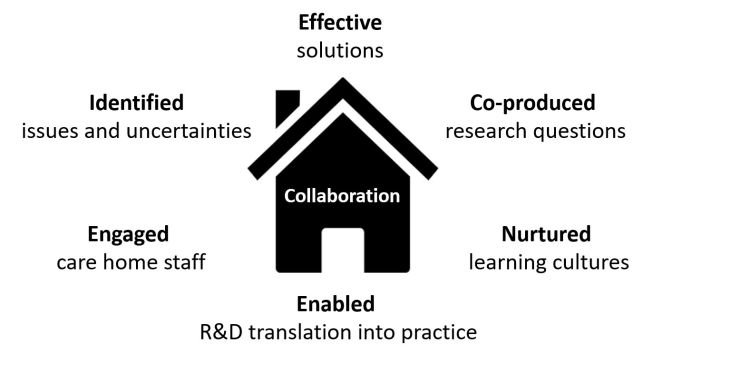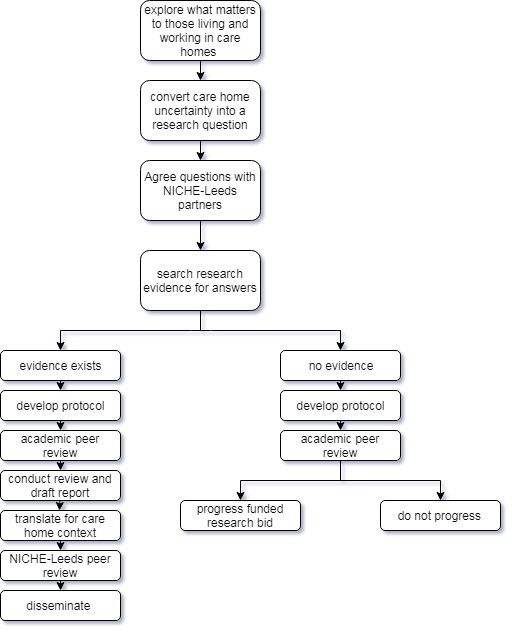NICHE-leeds
- Start date: Nov 2018
- End date: -
- Value: initial investment £30k (ongoing)
- Partners and collaborators: University of Leeds, Springfield Healthcare, Westwardcare, University of Maastricht, Netherlands Leeds Care Home Association
- Primary investigator: Professor Karen Spilsbury
- Co-investigators: Professor Carl Thompson, Dr Reena Devi, Alison Elwood, Kirsty Haunch .
- External co-investigators: -
- Postgraduate students: -

Description
What is NICHE-Leeds?
Nurturing Innovation in Care Home Excellence in Leeds (NICHE-Leeds) is a partnership between care homes and academia. It’s a platform that provides the leadership, expertise, and interdisciplinary collaboration that helps care homes innovate efficiently, effectively and sustainably. NICHE-Leeds is based on the Dutch Academic Collaborative Centre on Care for Older People - ACC-COP.
Why is it needed?
People living in care homes often have complex care needs, high levels of dependency and cognitive impairment. Many residents will die in their care home; in fact approximately 19% of all UK deaths happen in care homes. Care homes often innovate to help enhance clinical care, service delivery and their workforce but innovations are not always clinically or cost effective, or even based on sound research evidence. Implementing innovations can be difficult, and making sense of research, and implementing evidence-based solutions requires leadership, expertise and interdisciplinary collaboration between care homes and academia. NICHE-Leeds offers this collaboration.
Our principles
Clear transparent principles are important to NICHE-Leeds. The aim is to enhance and promote the quality of long term care for people residing in care homes based on the following:
i) Resident-centred focus: prioritising topics that matter to the people living or working in care homes. Undertaking research in areas that will promote quality of life, quality of care, choice and autonomy, and/or meaningful activities for residents, and the quality of work life for staff.
ii) Interdisciplinary collaboration: care home staff and researchers work in active and meaningful collaboration when developing research and translating knowledge into practice. Our care providers, policy makers, and education and research collaborators are equal partners; working together in a research process from identifying priorities to implementing evidence into practice.
iii) Mobilising and translating established research evidence into care home practice and policy, and where evidence is poor or missing generating new evidence through competitively funded research.
Our researchers are embedded in care homes - funded by care home providers. NICHE-Leeds, for the first time in the UK, replicates a Dutch model (ACC-COP) with a 20 year track record of success and impact.
The figure below captures the ambitions for NICHE-Leeds.

We are working on:
1. Successfully developing, delivering and sustaining a model for addressing research questions important to people living or working in care homes;
2. Identifying uncertainties and prioritising research questions with care homes and using appropriate methods to ensure research addresses key problems;
3. Using interdisciplinary collaborations and partnerships to deliver research;
4. Promoting value for money and a return on investment for our investors;
5. Leveraging additional funding from charitable and not for profit organisations, research councils and NIHR to grow research relevant with and for care homes; and
6. Translating research evidence into improved care home practice and standards.
In the longer term we will:
i. Grow NICHE-Leeds with other Leeds care home organisations
ii. Use external competitively funded research grants and fellowships (doctoral and post-doctoral) to build a sustainable programme of internationally relevant research;
iii. Forge stronger links with undergraduate health and social care programmes to inspire the next generation of health and care professionals for a role in ageing and long-term care.
Key features/stages of NICHE Leeds
1. Explore what matters to people living or working care homes?
This first stage identifies important research questions with care partners. For each home, we generate one mutually agreed priority/research question to work on. Researchers, care staff, relatives, and residents together explore what matters to people living or working in the home and through these discussions highlight clinical and/or care uncertainties. To identify uncertainties NICHE Leeds advocates in the care home (care home senior staff/managers):
-raise awareness of NICHE Leeds in the home, generating interest among staff and relatives
-organise meetings where researchers meet with care staff/relatives
-attend NICHE Leeds meetings and feedback sessions
Often the research questions need refining and so various iterations are sometimes needed before we finally agree on the research question with care home partners.
2. Providing answers
The NICHE-Leeds researchers search for research evidence to try and answer the research question. Where there is strong evidence, we work with the care home to translate it into an accessible format for care home practice and/or policy. Using peer review, we quality assure all our outputs before disseminating them.
Where evidence exists, we:
- develop an evidence review protocol which will address the question
- peer review the protocol with academic partners
- researchers to conduct and deliver an evidence review and produce a report of findings for peer reviewed academic publication
- translate findings for each care home’s context prior to wider dissemination (see below)
Where evidence does not exist, we:
- draft a brief research protocol that could tackle the research question. This will include a (i) justification for the primary study; (ii) outlined aims and objectives; and (iii) potential methods
- use the protocol to determine potential for funding (and funders) and to configure a team with the relevant skills, knowledge and expertise to develop the proposal
3. Embed research in practice and policy
We efficiently translate and embed research evidence into care home practice and policy using theoretically-informed frameworks to help guide our dissemination and evidence adoption strategies. Our two core mechanisms are timely access to good quality and relevant research evidence and, close collaboration with on-going researcher and care provider relationships.
a. Timely, relevant and actionable communication
We work closely together ensuring clear and concise messages are communicated effectively for residents and relatives, care home staff, providers and policy-makers. We pay attention to the elements of research communication that make outputs useful: timely, readable, actionable, rigorous, relevant and contextualised. We use a range of media including, tailored and targeted summary briefings, engagement events, online web-based communication and both traditional and social media. Choice of specific engagement activities and communication channels are guided by theory and research into dissemination and knowledge mobilisation alongside the needs and preferences of our partners. We have an agreed NICHE-Leeds ‘house style’ for all our outputs to build recognition and credibility.
Our written publication strategy includes publishing in high-impact academic, open access, policy and professional journals, to ensure our contribution to the evidence base endures. We present findings at multidisciplinary UK and international meetings as well as local seminars and conferences.
b. Building trusted and enduring partnerships
We have two levels for engagement with NICHE-Leeds: (i) strategic management level and (ii) individual project level. For both levels we use methods and channels that take into account:
- the needs and preferences of our partners;
theory and research on dissemination and knowledge mobilisation;
our experience of rigorous, relevant dissemination in reasonable timeframes.

Impact
The care homes that work with us as partners are committed to taking part in primary research and implementing research based innovations that are appropriate and cost-effective.

